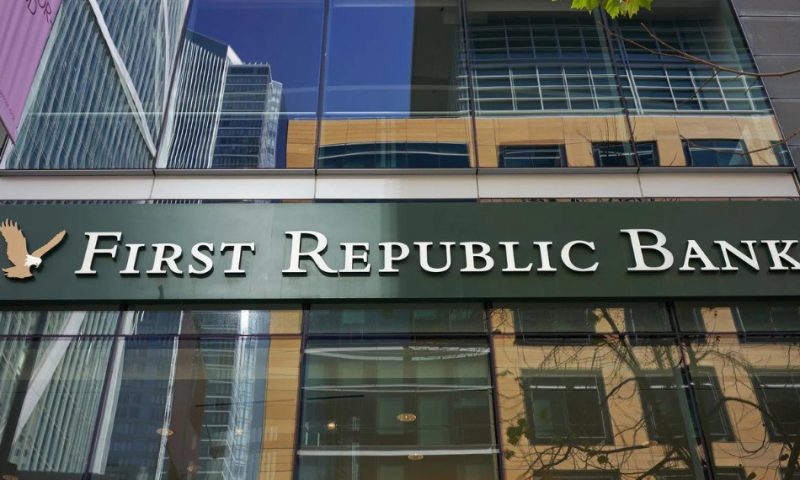First Republic Bank slumps 30% to end with a market cap of less than $1 billion
U.S. stocks ended mostly lower on Wednesday as robust earnings from big tech companies boosted the Nasdaq Composite, but concerns about First Republic Bank weighed on the broader market after the San Francisco-based lender revealed an exodus of deposits in March in the aftermath of Silicon Valley Bank collapse.
How stocks traded
On Tuesday, the Dow Jones Industrial Average fell 345 points, or 1.02%, to 33,531, the S&P 500 declined 65 points, or 1.58%, to 4,072, and the Nasdaq Composite dropped 238 points, or 1.98%, to 11,799.
What drove markets
A sharp rally in big tech stocks on upbeat quarterly earnings results contributed to an upturn for U.S. stocks on Wednesday morning, but major stock indexes reversed some gains to end mostly lower as investors turned attention to the renewed banking sector stress.
Microsoft (MSFT) jumped on Wednesday after the software giant reported well-received earnings and forecasts following Tuesday’s closing bell. Google parent Alphabet (GOOGL) also pleased investors with its results, but its shares ended 0.1% lower after trading in positive territory in the morning session.
“Microsoft and Alphabet, two firms whose fates feel increasingly intertwined thanks to their competing AI search offerings, both demonstrated some resilience as their earnings came in ahead of forecast,” according to Russ Mould, director at AJ Bell investment.
Megacap tech stocks have been leading stocks’ rally so far this year, and the robust earnings from Microsoft and Google have helped boosted investors’ confidence, said Dan Eye, chief investment officer at Fort Pitt Capital Group.
However, notable gains in tech stocks failed to boost the broader stock market on Wednesday. Dow industrials finished over 200 points lower, with shares of Home Depot, Inc. (HD), Honeywell International Inc. (HON), and Merck & Co. (MRK) dragging the average lower, according to Dow Jones Market Data.
Some market strategists think tech earnings beats are unlikely to propel a sustainable stock-market rally as valuations for companies remain high, while recession fears will likely cap market sentiment.
Mark Haefele, chief investment officer at UBS Global Wealth Management, said the forward price-to-earnings ratio of the S&P 500, now stands at 18x, is near its highest levels in about a year, and higher than pre-pandemic levels.
“Historically, when the S&P 500 has traded above 18x, consensus earnings growth expectations were 14% on average, or the 10-year Treasury yield was less than 2%. Today, markets estimate S&P 500 earnings to grow 5% in the second half of this year, and the 10-year Treasury yield is 3.4%,” wrote a team of strategists led by Haefele, in a Wednesday note.
Meanwhile, recent economic data continue to depict an overall weakening U.S. economy. “We expect equities to be range-bound in the near term as the market oscillates between the soft-landing and recession narratives,” strategists said.
Renewed concerns about First Republic Bank (FRC) also weighed on market sentiment. The San Francisco-based lender said Monday that it lost roughly 40% of its deposits in the first quarter following the collapse of two regional U.S. banks under the weight of heavy losses on their bond portfolios and a massive run on deposits.
Shares of First Republic Wednesday extended a sharp slump from a day earlier, putting the beleaguered regional bank on track to close with a market cap of less than $1 billion, according to Dow Jones Market Data.
“The problems at First Republic Bank have undoubtedly reopened the sores from March, as investors fret about the financial system again, and while the big U.S. banks largely impressed at the start of this earnings season, numbers from regional lenders… look set to be under heavy scrutiny in the coming days and weeks,” said Mould.
The trouble around First Republic “certainly says we’re not out of the woods yet,” said Eye. He noted that the lender seems to be an outlier in terms of the deposit flight. “We have not seen that type of outflow with other banks,” Eye said in a call.
In U.S. economic data, durable-goods orders jumped 3.2% last month, the government said Wednesday. Economists polled by the Wall Street Journal had forecast a 0.5% increase. Still, orders rose a scant 0.3% if autos and planes are excluded. The transportation segment is a large and volatile category that often exaggerates the ups and downs in industrial production. What’s more, business investment fell for the fourth time in the past five months, in another sign that the U.S. economy is slowing.
The U.S. trade deficit in goods shrank 8.4% in March to a four-month low of $84.6 billion due a snapback in U.S. exports, potentially giving a small lift to gross domestic product in the first quarter.

